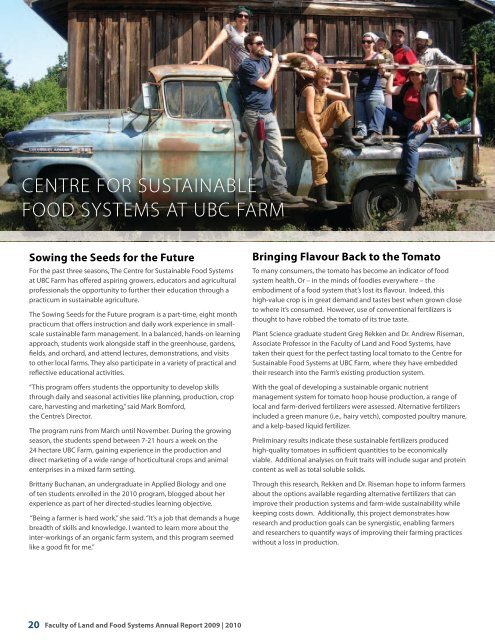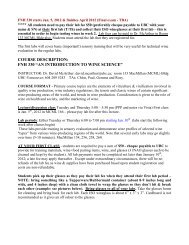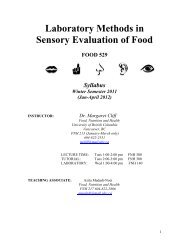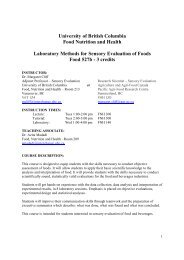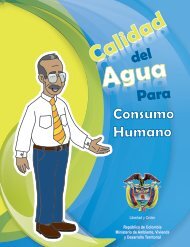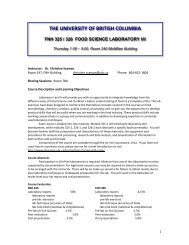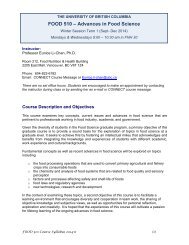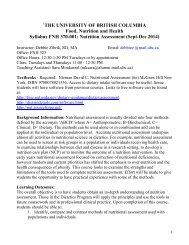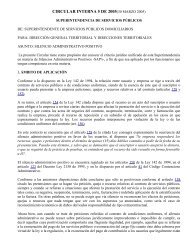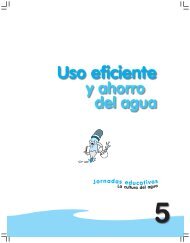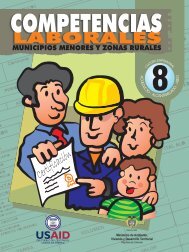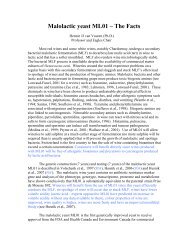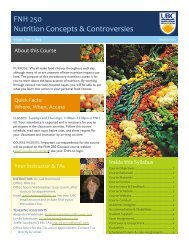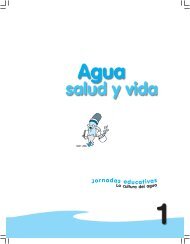download it as a PDF - Faculty of Land and Food Systems ...
download it as a PDF - Faculty of Land and Food Systems ...
download it as a PDF - Faculty of Land and Food Systems ...
- No tags were found...
Create successful ePaper yourself
Turn your PDF publications into a flip-book with our unique Google optimized e-Paper software.
CENTRE FOR SUSTAINABLEFOOD SYSTEMS AT UBC FARMSowing the Seeds for the FutureFor the p<strong>as</strong>t three se<strong>as</strong>ons, The Centre for Sustainable <strong>Food</strong> <strong>Systems</strong>at UBC Farm h<strong>as</strong> <strong>of</strong>fered <strong>as</strong>piring growers, educators <strong>and</strong> agriculturalpr<strong>of</strong>essionals the opportun<strong>it</strong>y to further their education through apracticum in sustainable agriculture.The Sowing Seeds for the Future program is a part-time, eight monthpracticum that <strong>of</strong>fers instruction <strong>and</strong> daily work experience in smallscalesustainable farm management. In a balanced, h<strong>and</strong>s-on learningapproach, students work alongside staff in the greenhouse, gardens,fields, <strong>and</strong> orchard, <strong>and</strong> attend lectures, demonstrations, <strong>and</strong> vis<strong>it</strong>sto other local farms. They also participate in a variety <strong>of</strong> practical <strong>and</strong>reflective educational activ<strong>it</strong>ies.“This program <strong>of</strong>fers students the opportun<strong>it</strong>y to develop skillsthrough daily <strong>and</strong> se<strong>as</strong>onal activ<strong>it</strong>ies like planning, production, cropcare, harvesting <strong>and</strong> marketing,” said Mark Bomford,the Centre’s Director.The program runs from March until November. During the growingse<strong>as</strong>on, the students spend between 7-21 hours a week on the24 hectare UBC Farm, gaining experience in the production <strong>and</strong>direct marketing <strong>of</strong> a wide range <strong>of</strong> horticultural crops <strong>and</strong> animalenterprises in a mixed farm setting.Br<strong>it</strong>tany Buchanan, an undergraduate in Applied Biology <strong>and</strong> one<strong>of</strong> ten students enrolled in the 2010 program, blogged about herexperience <strong>as</strong> part <strong>of</strong> her directed-studies learning objective.“Being a farmer is hard work,” she said. “It’s a job that dem<strong>and</strong>s a hugebreadth <strong>of</strong> skills <strong>and</strong> knowledge. I wanted to learn more about theinter-workings <strong>of</strong> an organic farm system, <strong>and</strong> this program seemedlike a good f<strong>it</strong> for me.”Bringing Flavour Back to the TomatoTo many consumers, the tomato h<strong>as</strong> become an indicator <strong>of</strong> foodsystem health. Or – in the minds <strong>of</strong> foodies everywhere – theembodiment <strong>of</strong> a food system that’s lost <strong>it</strong>s flavour. Indeed, thishigh-value crop is in great dem<strong>and</strong> <strong>and</strong> t<strong>as</strong>tes best when grown closeto where <strong>it</strong>’s consumed. However, use <strong>of</strong> conventional fertilizers isthought to have robbed the tomato <strong>of</strong> <strong>it</strong>s true t<strong>as</strong>te.Plant Science graduate student Greg Rekken <strong>and</strong> Dr. Andrew Riseman,Associate Pr<strong>of</strong>essor in the <strong>Faculty</strong> <strong>of</strong> <strong>L<strong>and</strong></strong> <strong>and</strong> <strong>Food</strong> <strong>Systems</strong>, havetaken their quest for the perfect t<strong>as</strong>ting local tomato to the Centre forSustainable <strong>Food</strong> <strong>Systems</strong> at UBC Farm, where they have embeddedtheir research into the Farm’s existing production system.W<strong>it</strong>h the goal <strong>of</strong> developing a sustainable organic nutrientmanagement system for tomato hoop house production, a range <strong>of</strong>local <strong>and</strong> farm-derived fertilizers were <strong>as</strong>sessed. Alternative fertilizersincluded a green manure (i.e., hairy vetch), composted poultry manure,<strong>and</strong> a kelp-b<strong>as</strong>ed liquid fertilizer.Preliminary results indicate these sustainable fertilizers producedhigh-qual<strong>it</strong>y tomatoes in sufficient quant<strong>it</strong>ies to be economicallyviable. Add<strong>it</strong>ional analyses on fru<strong>it</strong> tra<strong>it</strong>s will include sugar <strong>and</strong> proteincontent <strong>as</strong> well <strong>as</strong> total soluble solids.Through this research, Rekken <strong>and</strong> Dr. Riseman hope to inform farmersabout the options available regarding alternative fertilizers that canimprove their production systems <strong>and</strong> farm-wide sustainabil<strong>it</strong>y whilekeeping costs down. Add<strong>it</strong>ionally, this project demonstrates howresearch <strong>and</strong> production goals can be synergistic, enabling farmers<strong>and</strong> researchers to quantify ways <strong>of</strong> improving their farming practicesw<strong>it</strong>hout a loss in production.20 <strong>Faculty</strong> <strong>of</strong> <strong>L<strong>and</strong></strong> <strong>and</strong> <strong>Food</strong> <strong>Systems</strong> Annual Report 2009 | 2010


